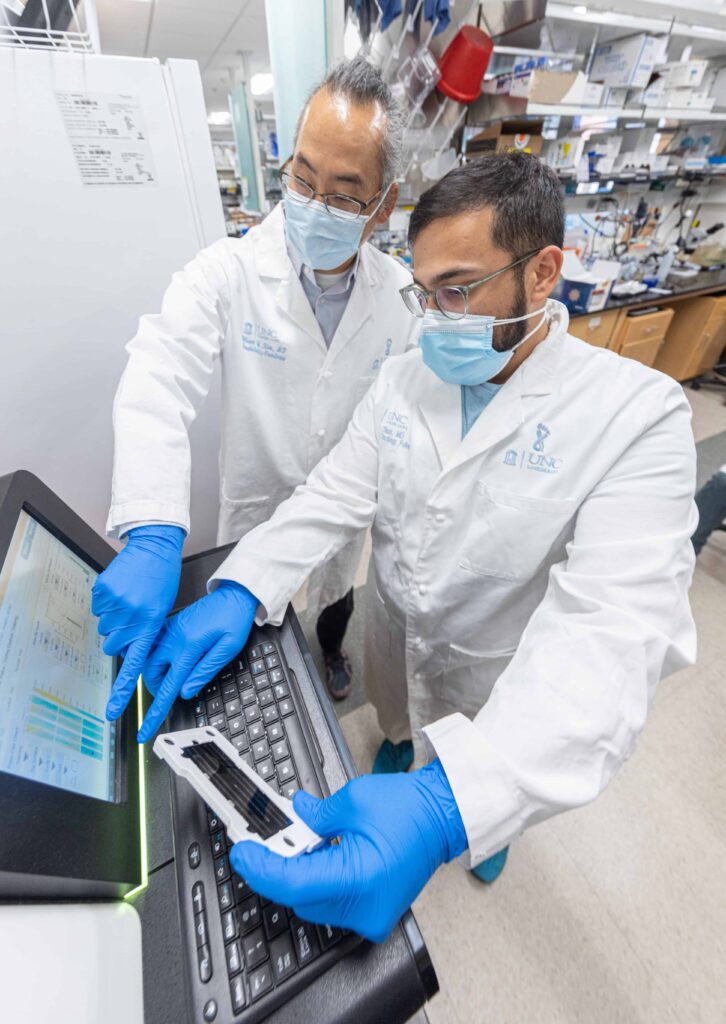Our Research
Bladder Cancer Research at UNC Lineberger

UNC Lineberger leads the way in bladder cancer care and innovative, cutting-edge cancer research.
Through the establishment of the Bladder Cancer Center of Excellence, UNC Lineberger brings together a collaborative, multidisciplinary team comprised of world-renowned bladder cancer physicians and researchers to identify areas of critical need.
The Bladder Cancer Center of Excellence aims to advance basic, translational and clinical research to drive understanding and better therapies for patients across North Carolina and beyond.
Our approach centers around three major facets of bladder cancer: Basic and Translational Research, Clinical Trials and Patients Outcomes. These three areas are fully integrated and all build on each other.
Basic and Translational Research
Scientists at UNC Lineberger are driving advances in bladder cancer biology. UNC has a decades-long track record in innovative research, which has and will continue to change the paradigm of bladder cancer research worldwide.
- In 2014, UNC researchers Jeffrey Damrauer, PhD, and William Kim, MD, were among the first in the world to identify and characterize novel molecular subtypes of muscle invasive bladder cancer. These subtypes, Basal-like and Luminal, have been repeatedly validated in numerous publications and are now universally regarded to be the highest order of bladder cancer subtypes.
- The William Kim Lab has developed multiple mouse models of bladder cancer. This, along with UNC’s Mouse Phase 1 Unit, position UNC as a world leader in the understanding of bladder cancer initiation and progression through the use of clinically relevant models, which are indispensable to the development of novel therapeutics.
- Urologist Marc Bjurlin, DO, MSc, FACOS, demonstrated that carcinogens from e-cigarettes could be found in urine. This first in its field study sets the groundwork for investigating if and how e-cigarette use could be a risk factor for bladder cancer, similar to traditional cigarette use.
- A multidisciplinary group of doctors and researchers, including Bjurlin and Kim, are now collaborating using mouse models to further explore the effects of e-cigarettes on the bladder and its relationship to bladder cancer.
Clinical Trials
Because of the integrated nature of the Bladder Cancer Center of Excellence, we are positioned to quickly move from preclinical studies to clinical trials, as well as using the clinical trials to inform basic and translational research questions.
- A study by Tracy Rose, MD, MPH, has demonstrated that patients with advanced bladder cancers, whose tumors have a mutated FGFR3 gene, respond to immunotherapy treatment in a manner that is similar to patients without that mutation, a discovery that runs counter to previous assumptions.
- Another recent study from Rose and Matthew Milowsky, MD, FASCO, focuses on the use of immunotherapy combined with chemotherapy before surgical removal of the bladder in muscle-invasive bladder cancer. Researchers found the regimen reduced the invasiveness of the cancer in 56% of patients in a Phase II clinical trial.
- A new mouse model study from Kim and Rose found that adding the experimental drug entinostat to an immunotherapy-like treatment substantially boosted cancer remission. This approach shows such promise that it’s already being tested in an ongoing window of opportunity clinical trial in people with advanced bladder cancer.
Patient Outcomes
All of our translational research and clinical trials have one goal: to design and implement better treatment strategies to improve patient outcomes.
- Angela Smith, MD, MS, FACS, and Ethan Basch, MD, MSc, are looking at post-op symptoms and creating an electronic alert when symptoms pass certain thresholds in patients undergoing bladder removal surgery.
- Smith is involved in a collaborative study (CISTO) with the University of Washington that looks at non-muscle invasive bladder cancer treatment options, including removing the tumor while leaving the bladder in place and application Bacillus Calmette-Guérin inserted directly into the bladder. Patients often have to choose between risking bladder cancer progression and removal of the bladder. The results from CISTO may provide better evidence about the clinical and quality of life outcomes so patients, caregivers and providers can make more informed treatment decisions.
